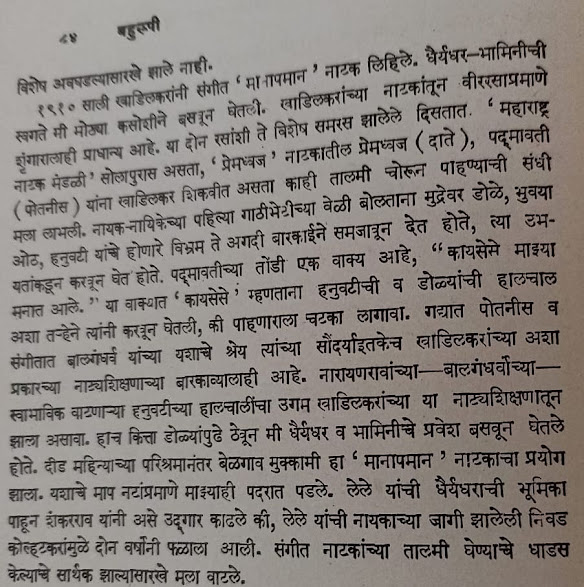माझी संगीत मानापमान या विषयावरची जानेवारी २०११ मधली पहिली पोस्ट इथे पहा ...
अलीकडच्या मानापमान सिनेमाबद्दल भावे साहेब एका मुलाखतीत म्हणाले की मी एक चांदोबातील कालातीत गोष्ट काढली आहे ...मला ऐकून वाटले मग सिनेमाचे नाव पण 'चांदोबातील गोष्ट' असेच द्यायचे ...
भावे म्हणतात की त्यांना पौराणिक विषयावरच्या नाटकावर सिनेमा बेतायचा नवहता , पण ते तर खाडिलकरांनाच नको होते (पहा: 'गंधर्वयुग', लेखक गंगाधर गाडगीळ, २००५, पृष्ठ ४२), त्यांनी अत्यंत यशस्वी पौराणिक पण गद्य नाटक (किचकवध) लिहले होते, म्हणून ते एक हलकं , फुलकं , गोडवा असलेले (पण महान संगीत सौभद्र सारखे पौराणिक नव्हे) संगीत नाटक त्यांनी लिहले , मग आता अजून पुढे जाऊन चांदोबाची गोष्ट कसली?
अधुनिक मराठी रंगभूमीच्या इतिहासातील सर्वात यशस्वी नाटक जसेच्या तसे मराठी सिनेमा म्हणून का काढता येत नाही, हे मला कधी समजणार नाही...
शेक्सपियर ची अनेक नाटके सिनेमात आली आहेत , अगदी हिंदी भाषेत सुद्धा , जसे मकबूल , जे मला फार आवडले .. असे म्हणतात की राम गणेश गडकरींचे 'एकच प्याला', १९१७ हे सुद्धा ऑथेल्लो वर आधारित आहे असे प्रल्हाद केशव अत्रे म्हणतात...
'बहुरूपी', चिंतामण गणेश कोल्हटकर, पृष्ठ ८४, १९५७-१९९८
